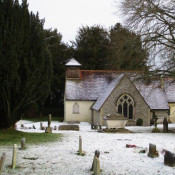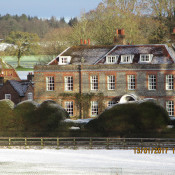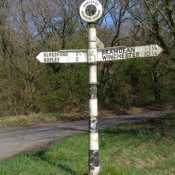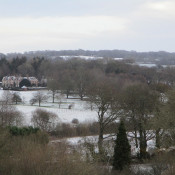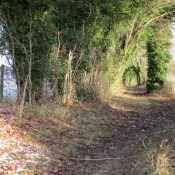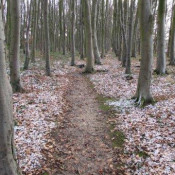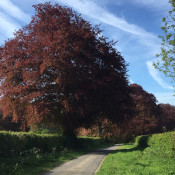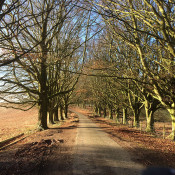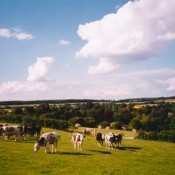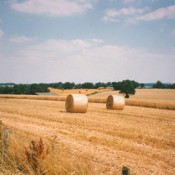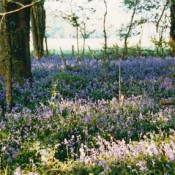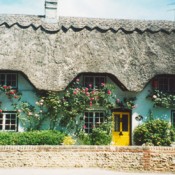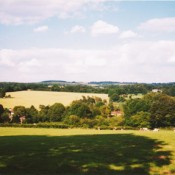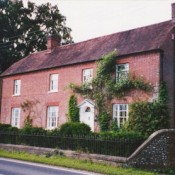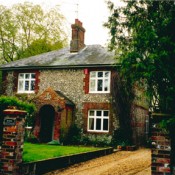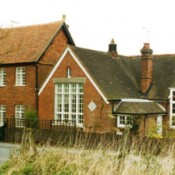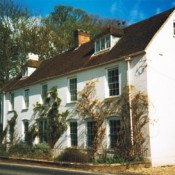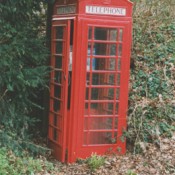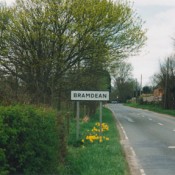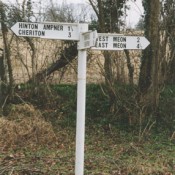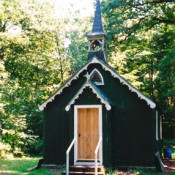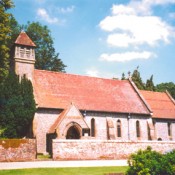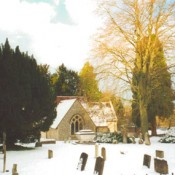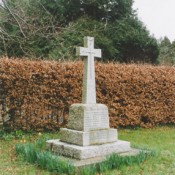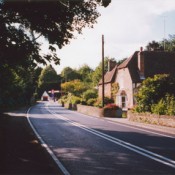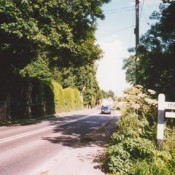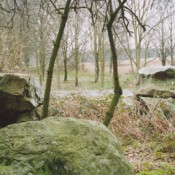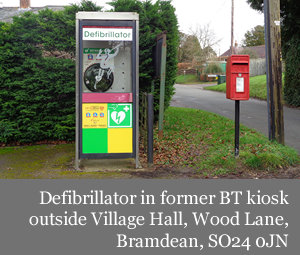Audrey Blake
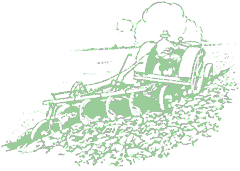 As I look from my bedroom window on a lovely spring morning, I can’t help myself thinking, have I really lived here in this small village of Bramdean for seventy odd years? Not quite all the time, a few years out for the duration of the Second World War for a spell in the WAAE Bramdean hasn’t changed very much, more houses, different landscape, not as rural but still the same trees we climbed, same hedges, paths and fields. But nobody would know where Currants, Peafield, Brache, Weavers or Flat Backs were. These were some of the names of the fields.
As I look from my bedroom window on a lovely spring morning, I can’t help myself thinking, have I really lived here in this small village of Bramdean for seventy odd years? Not quite all the time, a few years out for the duration of the Second World War for a spell in the WAAE Bramdean hasn’t changed very much, more houses, different landscape, not as rural but still the same trees we climbed, same hedges, paths and fields. But nobody would know where Currants, Peafield, Brache, Weavers or Flat Backs were. These were some of the names of the fields.
I was born in Rose Cottage, the third of six children, two sisters and three brothers. We didn’t have a lot of money in the family but we really didn’t go without. We were never hungry, we were well dressed, usually jumble sale, we were always clean and tidy and always had Sunday best which we dare not wear during the week.
When I was eight Mum had to go into hospital. Lady Capper (who lived in Bramdean House), came to the family’s rescue and offered to take my younger sister Midge and me and look after us until Mum was better. Rene my older sister was ten and she had to help Dad with the little ones. We had never been away from home and after a very tearful night it was decided we would only go for meals. We had our meals in the servants’ hall with the cook, housemaid, house parlour maid and ladies maid. It was awe inspiring. Mrs Griffiths the cook, looked very severe and we were a bit frightened at first. When she learned I could play crib (I used to play with my uncle and I was very good) she was my friend, but after I had beaten her twice she got quite cross. The next game she won. She felt sorry for me and gave me a sweet as consolation. After that I let her win, it was worth it for the sweet.
Lady Capper was a wonderful person who helped everyone who needed it. She would go round the village with soup and visit all the sick and old. At Christmas all the village children would be invited to a party. After having our tea in the servants’ hall, we would then walk down a long dark passage into the billiard room. When we were assembled a giant Christmas tree was lit, to us it was magic. We were given a lovely present, really the only one we had. Sir John Capper was very much involved with the airship R101 but I don’t know in what way. We as children saw it before it crashed and it was a very impressive sight.
At eight years old we went to Hinton Ampner School. It was a church school and was endowed by William Blake, who had married the daughter of the owner of Hinton House. He outlived his wife and when he died in 1733 he left money for the school to be built. We walked to school, took a penny Oxo and a piece of bread for our lunch. Sometimes we would run home, it was about a mile. We had three teachers, Mr Page our Headmaster, Mrs Garner for ten to twelve and Miss Budd for the Infants. We had one very big room that was divided in two, and another room for the infants. We had a large combustion stove which burnt coke. Separate play grounds for the boys and girls. Large pit lavvies with newspaper for toilet rolls. When we arrived at school, we were lined up and inspected by the Head to see if we were clean and tidy, hands and nails to be checked and if they were grubby we had to scrub them and lost a play period. Our numbers at school, forty per class. Roll call next, it was always ‘present Sir’ no mumbling. Our first lesson was religious instruction and prayers. The School Inspectors came round about twice a year and the best pupils were awarded a certificate. We had a good education. We left school at 4pm and had to go straight home, if we were not home by 4.30 Mum would wait with a swishy stick and would put it round our legs. My sister was always late and got the stick most days.
There was a school outing every year, we didn’t always go, Mum couldn’t afford it. One year my uncle paid five shillings each for my sisters and me. We went to Windsor and Hampton Court. Got lost in the maze, the trip on the river was a first for me.
There used to be some Roman paving slabs in one of the local fields. We were told that there was a tunnel running underground from Woodcote Manor to this field – but whether it did exist or not I don’t know. I know the tiles were taken away and given to a museum.
We had a scheme in the village for our medical needs, sixpence a week for the nurse, one shilling a week for the doctor for the whole family.
It was said that the river ran underground, our well in the house was deep so we always had plenty of water. We had a drought in 1932. A well was sunk just outside The Old Rectory, with a village pump. I remember seeing Walt Tanner, a local resident, making a concrete top for the well and putting on it W.T. 1932. I was about nine.
Round about 1934 we got electricity in the village, until then we had oil lamps and candles. We did have a Tilley lamp that gave out a lovely bright light and warmth. Electricity was lovely but not so cosy as lamps. Mum would tell us stories around the fire or we would listen to the radio at night. To run the wireless we had to have an accumulator, which had to be charged at the garage.
In the early 1900s Mr & Mrs Peeling had The Fox Inn at Bramdean. Their only daughter was murdered on Bramdean Common, on her way to music lessons in Ropley, by her boyfriend who wasn’t considered quite good enough for her. A farm labourer, his name was Jewel, he lived in West End Farm Cottages. His body was found next day. He had shot himself.
On Saturdays we would take our sandwiches and watch the cricket in Currants. They had a lovely pavilion there owned by Capt. Tudor Owen. Brockwood had a very good cricket team. Football matches were played, but no specific field, nobody minded. Sometimes the match would be on The Common. I think they had a pitch there.
We always celebrated special occasions with parties. 1935 King George V and Queen Mary’s celebration we had a lovely event in The Park. Tea, mugs for the children, races, I won five shillings in different events and was allowed to keep it. Bought a watch from Mark’s. So proud of it. We had a huge bonfire at the back of the Church. It is the only time I have seen a blue moon. Pitch was put on the fire and through the flames the moon looked blue.
Early in 1940 we had an ack-ack station at Old Park Wood with about ten soldiers manning the guns and an internment camp on Brockwood Dean manned by Americans. Authorities came round and nearly every household had to take evacuees, Mum had three from Portsmouth, they squeezed them in everywhere. We had one or two near misses with bombs. A stick of bombs came down over Firdale, my little brothers were looking for the craters and one of them was standing on an unexploded bomb. When they realised this they ran to Mr Bill Gerrard (he was a War Reserve) to tell him. He thought they were making it up and threatened to box their ears, they managed to convince him so he called out The Home Guard and they roped it off. The Bomb Squad came and took it away to blow it up.
We lost one of the church windows in a new type of blast bomb that landed and blasted a large area. In 1942 an aircraft was shot down in Mr Silk’s field by the sign of Bramdean. Two German pilots were taken into custody by the Home Guard. The hollow has been filled in now. Our house in Wood Lane shook and all the ornaments fell down.
Our warning for imminent invasion was the sounding of Bramdean House bell. This happened once at two in the morning, we all got up and dressed, it was a lovely moonlit night, we stood on the lawn waiting for the Germans, Mum with a rifle. After dawn we went back to bed.
I joined the WAAF as a flight mechanic, so was away from the village for four years, this included D-Day. The villagers held various dances and functions for our coming home and we all received a small sum from The Home Coming Fund. I did come home for V-J Day, we had a street party, a good get-together, most of us meeting in The Fox, but it wasn’t the same as D-Day. After four years in the Middle East Joe, my husband, got fourteen days leave, but had to go back on V-J Day.
We lost several in the village, Eric Wood from Hinton, at sea. Mr Freemantle coming home on leave caught in a London raid. Toby Small in a Japanese prisoner of war camp. His life was very sad. Joey Elliot, who came from Hinton, was in the Parachute Regiment.
There were a lot of evacuees from the Navy in the village – young wives and children. When ‘The Hood’ went down it was so sad, they hadn’t been long in the village, but everyone made these evacuees feel welcome. That was wartime, everyone helped one another and shared. Nobody disputed the requisition of all iron gates, railings, aluminium saucepans, all went to the war effort to help build up our armaments. The spirit of the village was one hundred percent.

